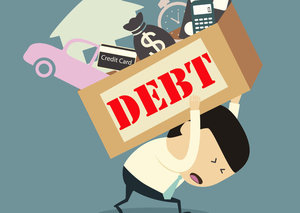 People who are keen to improve their financial situation are often advised by experts to make it a priority to get out of debt as soon as they can and stay out of debt if at all possible. For most people – perhaps including you – this is easier said than done. Unless you’re one of those for whom money is never an object, there are times in your life when you have little choice but to go into debt.
People who are keen to improve their financial situation are often advised by experts to make it a priority to get out of debt as soon as they can and stay out of debt if at all possible. For most people – perhaps including you – this is easier said than done. Unless you’re one of those for whom money is never an object, there are times in your life when you have little choice but to go into debt.Here we’re not talking about student loans and such, which are worthy of their own piece, but rather about the normal debts incurred once one is out in the “real” world. Whether you wish to buy a new car, take a much-needed holiday, do a home improvement or consolidate some of your other debts that may have gotten out of hand, you will doubtless find yourself needing a loan at one time or another.
And then of course there’s the “big one”: a mortgage, for those who are fortunate enough to get a leg up on the property ladder.
It’s little wonder that many people feel resigned to going through life with one debt or another hanging over their heads. Homeowners in particular have been feeling the pinch in recent years.
Mortgages: a big albatross for many
In October 2015 the Office for National Statistics (ONS) released data showing that in 2013, more than 1.1 million UK households were sitting on mortgage debts worth more than 4.5 times their income. The good news is that this is actually a slight drop compared to 2011, when 1.3 million households had mortgage debts at this level, representing a higher share of 14.5% of mortgagor households. The bad news is that the numbers still indicate that homeowners are vulnerable and could be adversely affected by the inevitable interest rate hikes.
The Resolution Foundation think tank’s chief economist Matthew Whittaker called it “concerning” that the number of households with high levels of mortgage debt relative to their income has fallen only slightly during a period of extraordinarily low interest rates. Said Mr. Whittaker, “With rate rises back on the agenda … it’s vital that banks engage with their customers to explain how their mortgage repayments could rise.”
Thanks to tougher mortgage lending rules that came into effect in April 2014, the banks have taken steps to make sure loans are truly affordable for home buyers and those looking to remortgage. They perform more thorough checks into the spending habits of prospective borrowers and are required to apply “stress tests” to mortgage applications to help ensure that the borrowers could still afford their payments if interest rates were to climb.
To further limit risky lending, the Bank of England, beginning in October 2014, also imposed limits on the supply of credit to highly leveraged households. (By their definition “highly leveraged” households are those with debt-to-income ratios above the 4.5 multiple.) And the formerly popular “interest-only” mortgages, once a viable option for financially challenged home buyers, are now, in the wake of the financial crisis, the sole province of affluent buyers.
But some feel that the newer protections still aren’t enough. The concern as expressed in the ONS report is that many households may have “normalised” lower interest rates and accordingly might have taken on more debt than is optimal for them in the long run. This could result in significant “mortgage distress” should interest rates rise to previous levels. One proactive step homeowners can take is to be diligent about reducing or eliminating their other debts, and to avoid taking on more debt if at all possible.
Arming yourself with knowledge can make it all a little easier.
Even if you’re not blessed with a house/burdened with a mortgage, you will still no doubt have to deal with lenders for various reasons. That’s no cause for distress. Debt may be a necessity at times but there are several things you can do to make it easier on yourself.
First off arm yourself with information. Thoroughly research the various types of loans available and once you’re clear about the type you need, research the lenders who provide that kind of loan, so you can choose one that offers reasonable rates and good customer service. Keep in mind that loans are a consumer product and lenders are competing for your money. Of course if you have excellent credit you’ll probably have a wider variety of choices, but even people with poor credit and low income can usually find an option that works for them.
If you have a lender in mind it is important not to simply rely on the content on their web site or in their ads. You’re better off consulting an objective third party source that provides pertinent information about the lender as well as reviews from people who have actually dealt with the company. And if you are still uncertain, consult with a qualified financial expert or, if debt is a problem, with one the numerous debt charities that help people work out their money issues.
Debt shouldn’t be a cloud that hangs over your head indefinitely. Manage your debts responsibly and make it a priority to pay them off as soon as possible. As well, always weigh every purchase and ask yourself if buying the item you’re considering is worth going into debt or further into debt. Debt is a responsibility, but it really doesn’t have to be a painful one.